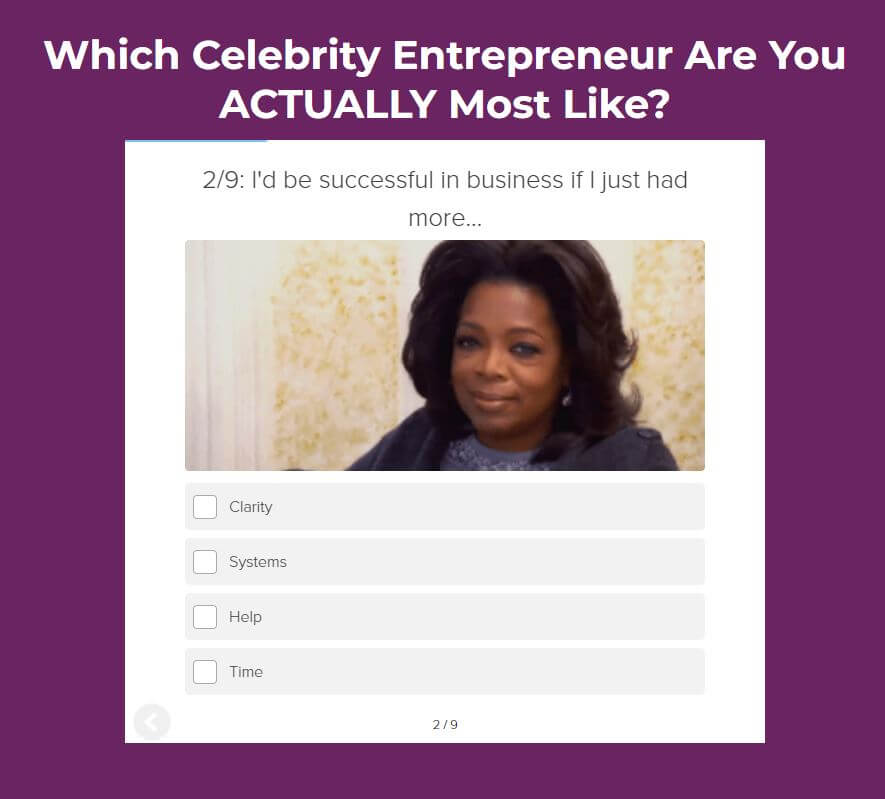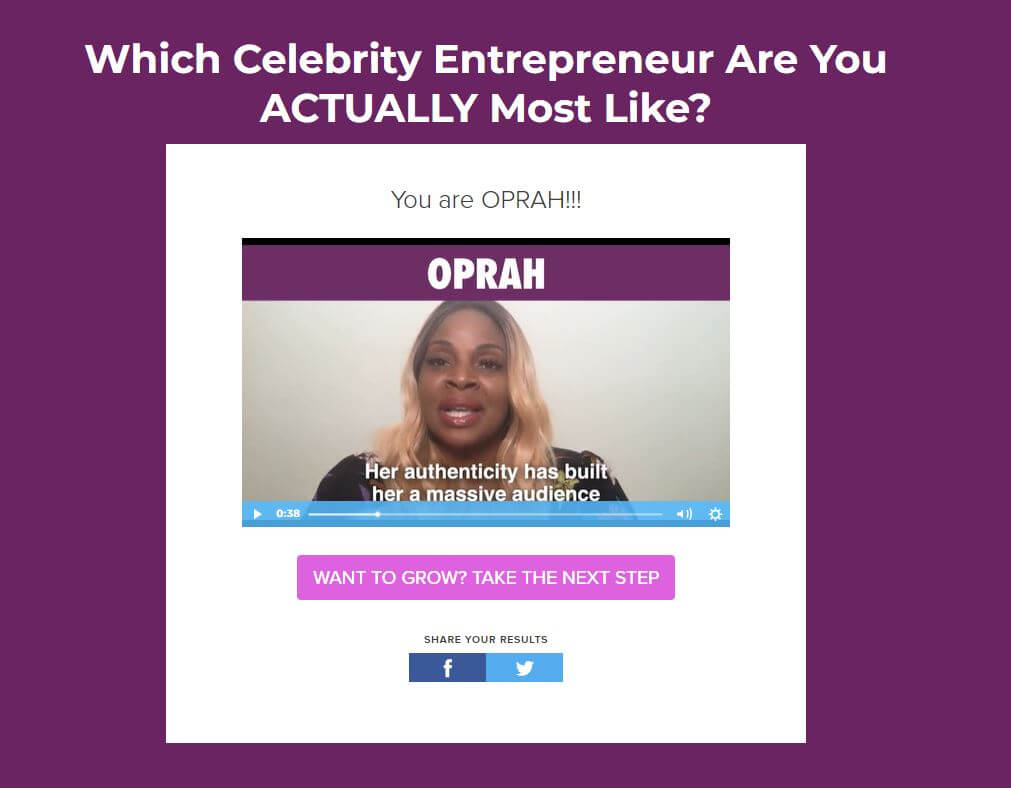The Ultimate Guide to Increasing Sales Through Lead Generation Quizzes
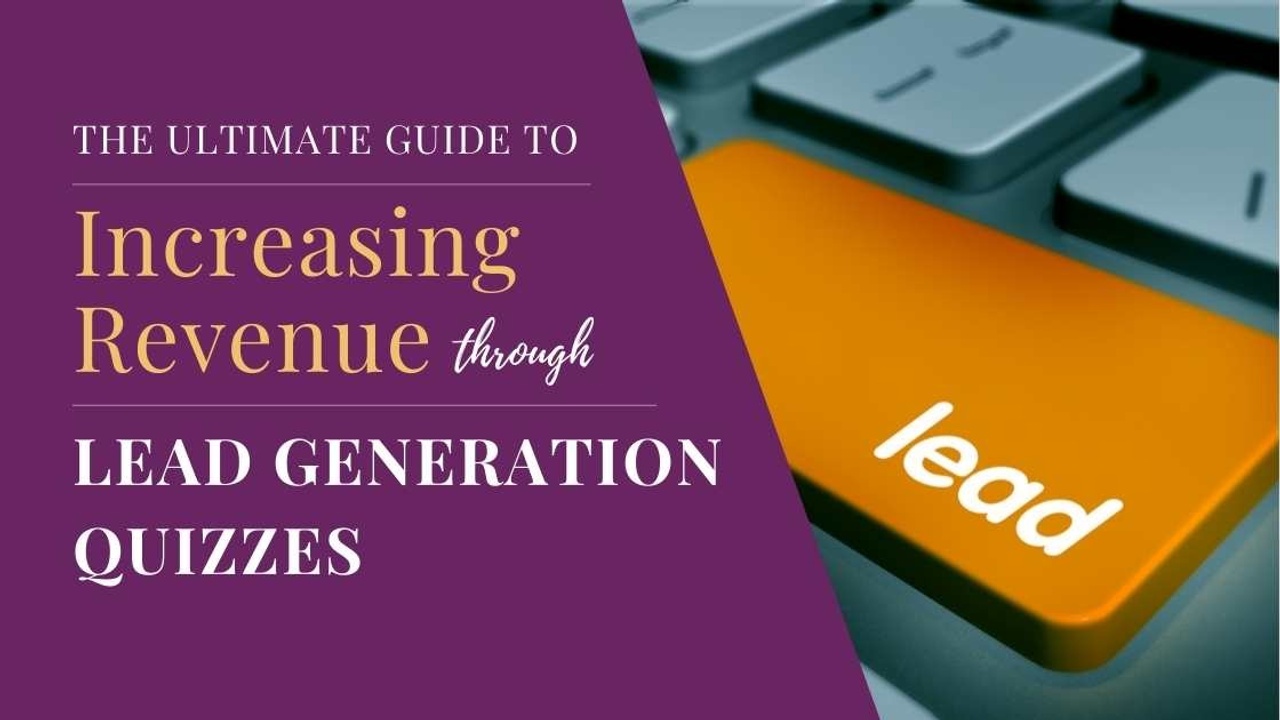
Do you want to generate consistent 5-figure sales month after month for your business?
Are you done winging it? Crossing your fingers and hoping each month will be big enough for you to meet your mortgage payment? Working overtime just to make ends meet?
The great news is that you’re in the right place. Whether you have an email list or not, you can grow your business consistently and easily through the power of lead generation quizzes, aka opt-in quizzes.
I’ve learned through working with dozens of clients that lead generation quizzes deliver results that PDF lead magnets, videos, and other marketing lead magnets can’t touch.
My strategy of creating lead generation quizzes is a proven way to build your email list and, more importantly, generate sales.
Keep reading because in this article I’ll lay out exactly how I build lead generation quizzes for clients that rake in massive returns.
Or, explore my free quiz title generator tool to hook your audience with the perfect quiz title.
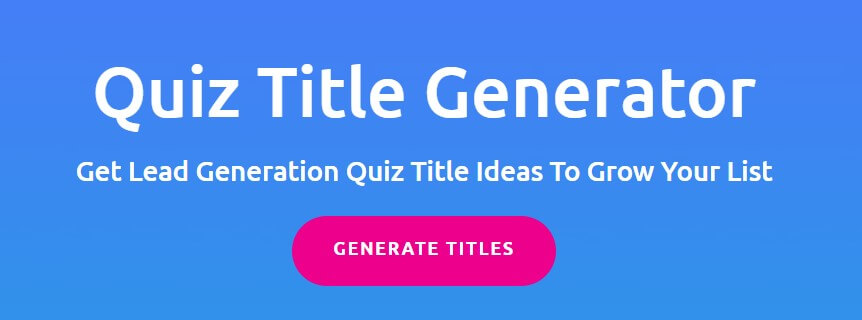
*Note: this article contains affiliate links.
TABLE OF CONTENTS
- 1. Why Lead Generation Quizzes?
- 2. Lead Generation is About Sales
- 3. Lead Generation Quiz Examples
- 4. How Quizzes Help You Understand Your Users
- 5. How to Best Capture Your Lead Generation Quiz Results
- 6. The M.O.A.T Method
- 7. Lead Generation Quiz Archetypes
- 8. Lead Generation Quizzes for Growing Your Business
- 9. Get to Know the Queen of Quizzes
Why Lead Generation Quizzes?
So, why do you need a lead magnet or opt-in quiz? What’s wrong with the PDF or ebook that you’ve been using to attract new sales?
Let’s use the analogy of a garden. Think about your potential customers as your prized roses. If you want them to grow, you need to nurture them.
Most importantly, you need to know something about them.
What kind of soil do they need to grow? How much water do they require? How much sunlight should they receive?
🌹 You can’t cultivate a rose garden until you know what it needs to flourish.
Your potential leads need to be treated the same way.
PDF lead magnets and videos take a firehose approach to nurturing potential customers. When you flood your garden, you will likely also kill your roses.
Some flowers might grow, but you’ll also get a lot of weeds that will steal vital nutrients from your roses and eventually edge them out.
The wrong lead magnet will either repel your ideal client or worse, attract a toxic client (we’ve all been there).
PDF Lead Magnets and Videos Grow Bad Leads. Quizzes Grow Good Leads Because They Give You Critical Information About Your Customers.
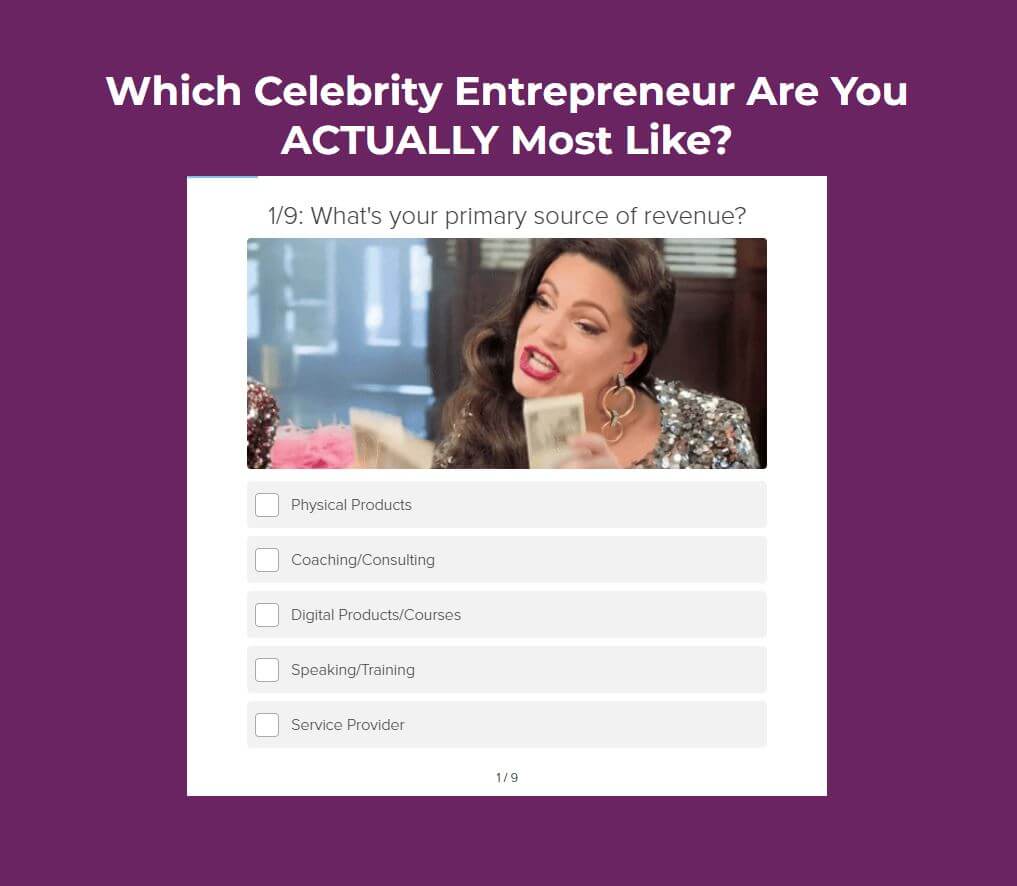
The lead generation quiz I use to attract and segment my ideal clients. You can take it here.
Lead Generation is About Sales
How many potential clients or customers are on your email list?
I have roughly 8,000. 👀
But, you should be less focused on the number of people on your email list and care more about whether they’re quality customers interested in your 1:1 coaching, consulting service, products, etc.
100 people who are interested in your offer is better than 1,000 who are not. 🙌🏾 🙌🏾 🙌🏾
I know this seems obvious, but when I work with clients I help them become less obsessed with growing their list for the sake of their list and more tuned in to growing their list with quality leads.
Do you want subscribers or sales?
This is a question that I always ask my clients because subscribers can lead to sales, but many of the subscribers on your list are likely a waste of time.
Lead generation quizzes give you information and intelligence about your potential clients.
This intel about your potential clients is pure gold. Think about it. When you ask your clients questions about themselves, you gain valuable information that helps you craft your offer to them.
Lead generation/opt-in quizzes are about personalizing your offer to customers and clients.
When you work with me, I will teach you how to personalize your quiz to gain valuable intel about your potential customers’ pain points. I’ll also show you how to leverage quizzes to make your offer more appealing to your potential clients and customers.
You can get started immediately by using my free Quiz Title Generator.
Gimme My Kickin’ Quiz Titles Now!
Lead Generation Quiz Examples
Personalization and segmentation are the entire purpose of deploying a lead generation quiz. When it comes to your customers and clients, you can think about them as Neapolitan ice cream.
You know Neapolitan ice cream, right? It has three flavors: chocolate, vanilla, and strawberry.
When you’re marketing your offer to prospective clients and customers, you need to be able to separate them into flavors. The same email that entices your vanilla clients won’t attract your strawberry clients.
Categorization and Segmentation will greatly enhance your ability to effectively pitch your offer to everyone on your list.
The quizzes listed below are general categories that can be used for a variety of purposes.
❓ Discovery Quizzes
You’re probably familiar with discovery quizzes. Most Buzzfeed quizzes are discovery quizzes.
- Discover Your Wedding Style with this Quiz
- What How You Take Your Coffee Says About You
- How Emo Are You: Match These Lyrics to the Band
*Actual Buzzfeed quizzes
We’ll delve into the psychology behind why people want to take quizzes throughout this article, but while we’re discussing Buzzfeed, it’s important to acknowledge some truisms about online quiz-taking.
- People love taking quizzes online. If you haven’t noticed, Buzzfeed has made an industry out of people taking them.
- We are psychologically wired to want to take quizzes. This goes back to the days of magazines before sites like Buzzfeed even existed. Are You Young at Heart? Are You Under Too Much Pressure at Work?
- Quizzes are shared on average 1,900 times among online users.
Discovery quizzes, or Buzzfeed-style quizzes, are designed to help potential clients understand something about themselves.
In the context of your business, you want them to discover something that’s useful to them.
Let’s say you’re a Life Coach.
Do you want a generic quiz: “Do I need a Life Coach?” Or do you want something more specific: “Do I Need a Life Coach or Psychologist?”
The second quiz is interesting because, as a life coach, you don’t want clients who actually need a psychologist. By repelling those from your list who should be seeking help from a psychologist, you’ll have better leads for your email marketing campaigns.

Discovery Quiz Title examples from my free Quiz Title Generator.
Create Irresistible Discovery Quiz Titles in Seconds
❓ Decision Quizzes
Decision quizzes are not about assisting your potential clients with discovering something about themselves. Instead, they are created to help users discover a better, faster, or more effective way of doing something.
If you’re a skincare expert, you might design a quiz such as: What’s the Best Natural Acne Treatment?
Or, if you’re a financial consultant, you might have a quiz about the best retirement plan for folks at different ages.
Decision quizzes work well for eCommerce stores because you can always direct users to the best thing they should buy given the pain points they select in their quiz.
You can entice them with your offer based on the decision they should make according to you as the expert.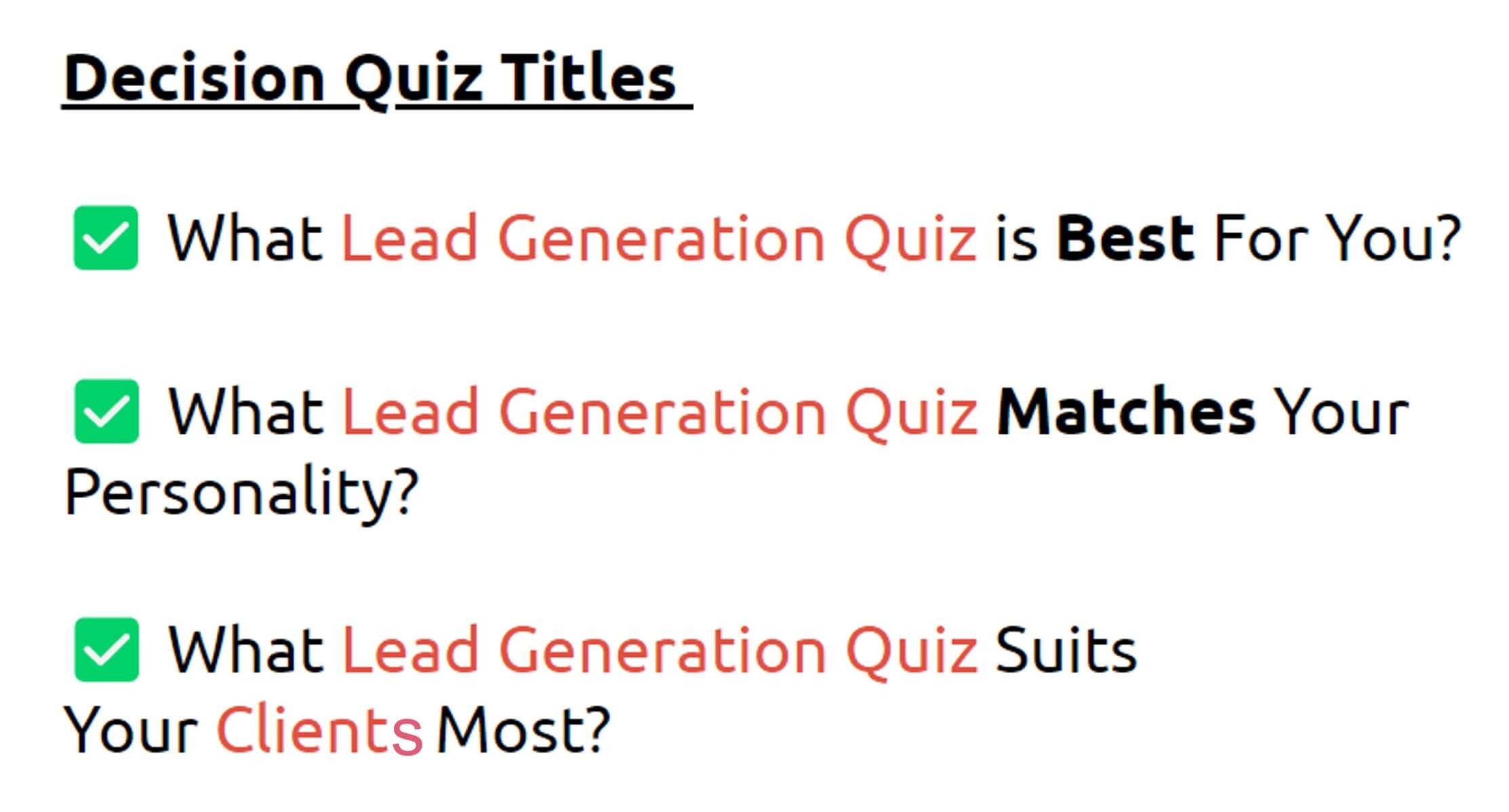
Decision Quiz Title examples from my free Quiz Title Generator.
❓ Diagnostic Quizzes
When it comes to diagnostic quizzes, you want your potential client or customer to diagnose a problem they’re having.
You want to attract prospective clients by directing their attention to problems and paying attention to both the title and tagline of your quiz.
Attracting your quiz takers with compelling titles and taglines goes for every type of quiz.
For example, if you’re a diet and exercise consultant, think about this title and tag for your diagnostic quiz:
- Why Doesn’t the Mediterranean Diet Work for Me?
- 7 Questions to Assess Your Body Type and Best Diet
Is the title compelling? Who would it draw into your taking your quiz?
Perhaps someone who has tried the Mediterranean Diet and failed? Maybe other people who want to know about the best diet for their body type.
Now, look at this example:
- 14 Questions to Assess Your Body Type and Find the Right Diet for You
- Lose Weight by Discovering the Best Diet Plan
The point of writing an enticing, appealing, and compelling title and subtitle for your quiz is that it magnetizes your audience. When I discuss my quiz matrix, MAGNETIZING your audience is one of my most important points of emphasis.
The title answers the questions that every potential quiz taker needs to know before they decide to take your quiz: What will this quiz tell me? What problem does it present that I need to solve? What is my desire and how will the answers to this quiz fulfill that desire?
Diagnostic quizzes for lead generation direct users to a possible problem they’re having and how to solve it.
But discovery quizzes, decision quizzes, and diagnostic quizzes all need a compelling title to draw your potential customers and clients into taking them—as I mentioned above.
You need to MAGNETIZE your audience by solving a problem, telling them something important about who they are, or helping them make a decision.
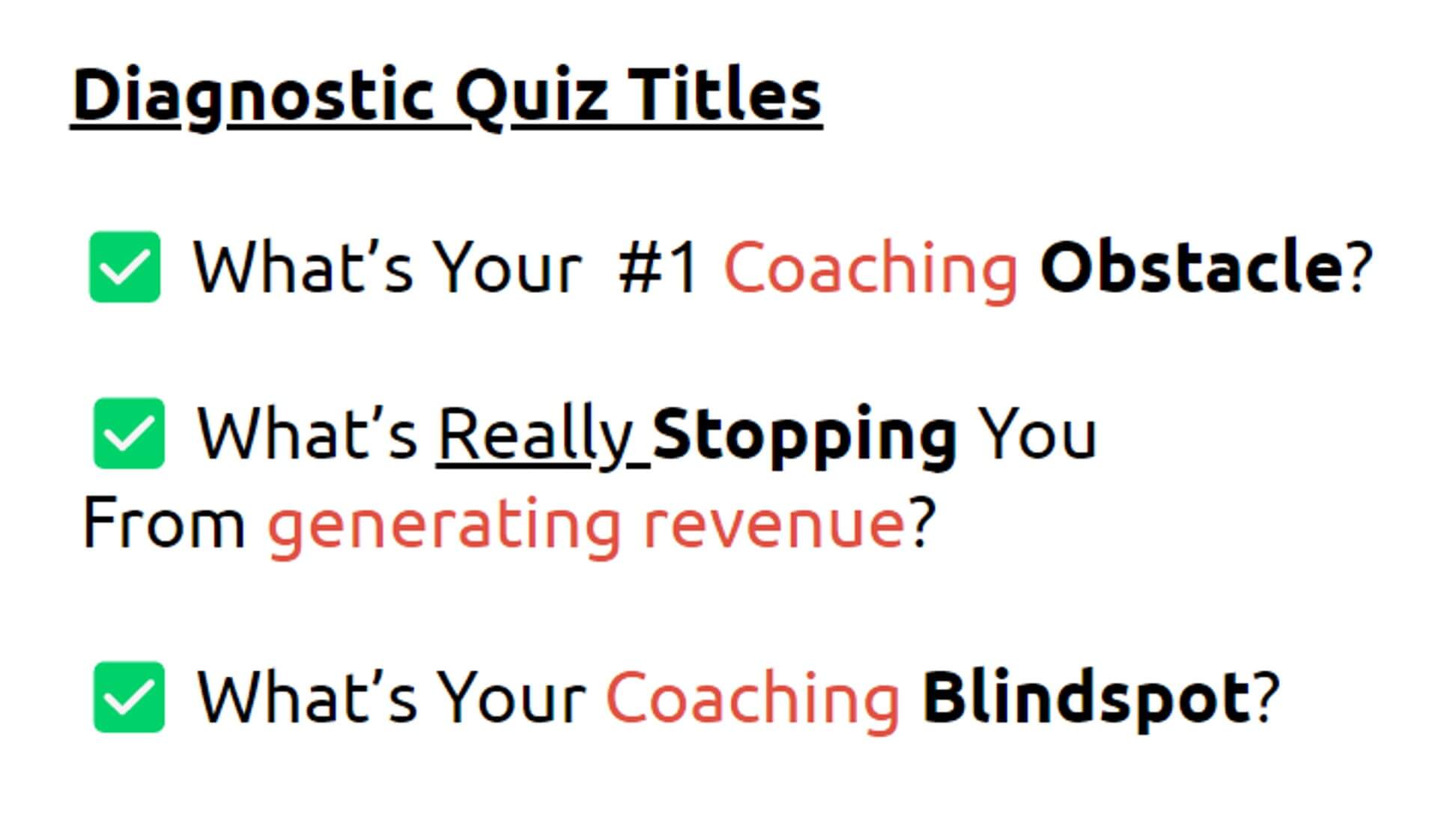
Diagnostic Quiz Title examples from my free Quiz Title Generator.
Ready to magnetize your audience with an alluring diagnostic quiz title? Use my free quiz title generator today!
❓ Dexterity Quizzes
I saved dexterity quizzes for last because they are my personal favorite. Dexterity quizzes help you identify a gap or insufficiency in your professional or personal life.
- How Much Do I Need to Save to Retire at 62?
- Where Are YOUR Ideal Clients hiding?
This is a classic example of a dexterity quiz. The person taking this quiz does not have enough money to retire today. If they did, they wouldn’t be taking the quiz, right? And they’re wondering: how much money do I need to close the gap between my age now and 62 to retire comfortably?
The reason I love dexterity quizzes is that they give you concrete information about what you need to do to improve your position in your life financially, personally, professionally, romantically, etc.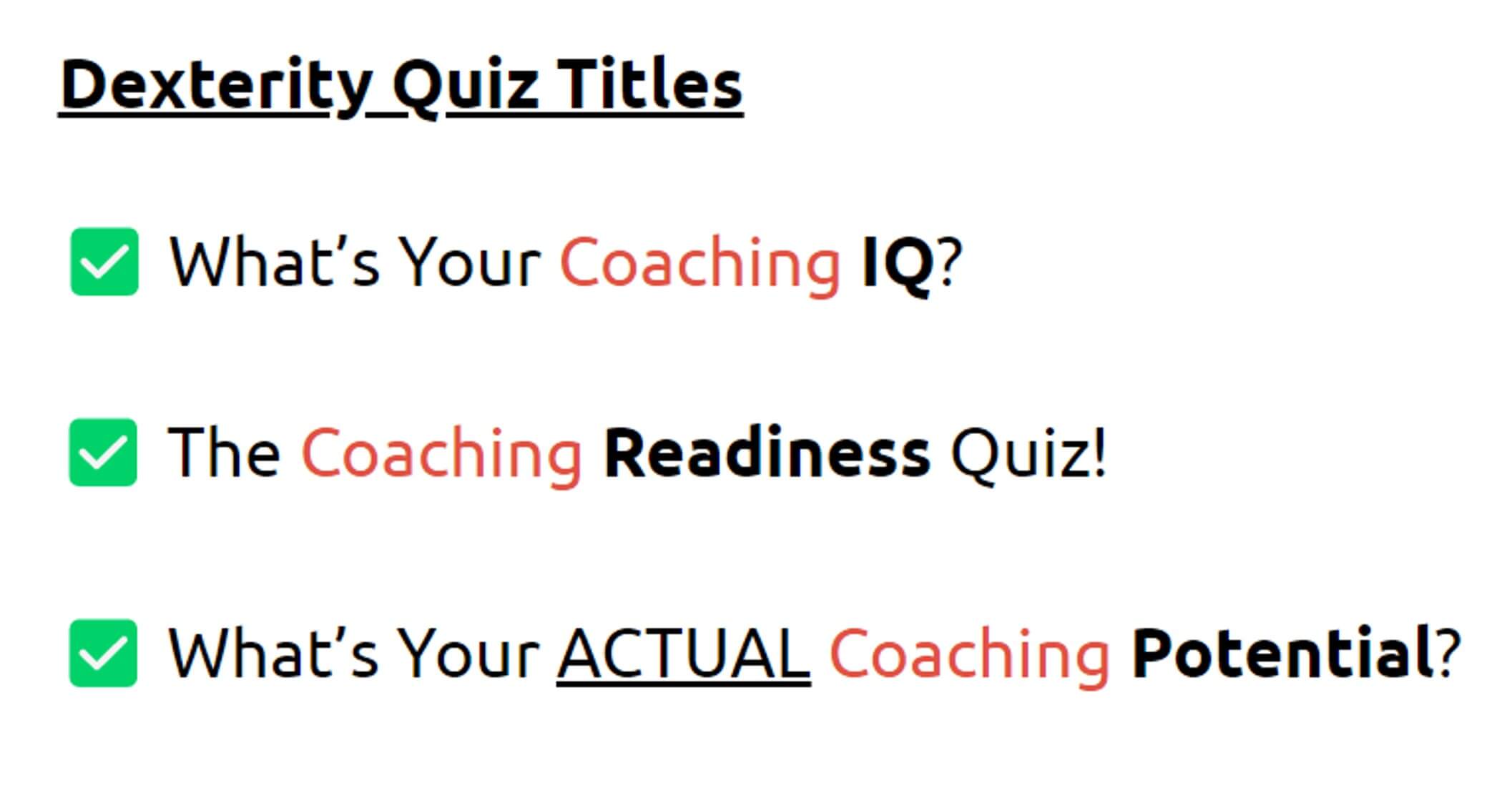
Dexterity Quiz Title examples from my free Quiz Title Generator.
How Quizzes Help You Understand Your Users
All the quizzes I’ve listed—discovery, decision, diagnostic, dexterity—will be applicable at different points and times. The category of quiz you choose matters less than how you word and build it.
A major benefit of using quizzes as a lead generation tool over PDFs or videos or other lead magnets is that you can finesse your questions to better understand what resonates with your users.
With quizzes, you can tell exactly where you’re losing your audience. If users stop taking your quiz at a high percentage on Question #3, then you need to rewrite or replace Question #3.
On the other hand, when you’re using a PDF as your lead generation magnet, how do you know when the user lost interest? If you pay a pretty penny for advanced analytics, you might be able to tell when someone dropped off a video, but reworking a video is arduous.
Using a case study, interactive worksheet, or other online tool to capture leads? While you can see how long your audience spends on these resources, you can’t view granular data that lets you know where to make changes. The best you can do is A/B testing to understand which version of a resource performs the best.
Other lead magnets make you guess what the problem is, while your quizzes will come right out and tell you. You can pinpoint exactly where the problem is, adjust your quiz accordingly, then iterate until your quiz is a client-closing machine.
When I present my quiz matrix, I discuss recognition. Quizzes enable you to immediately recognize what your prospective clients and customers want to know, and what questions they think will lead them to that answer.
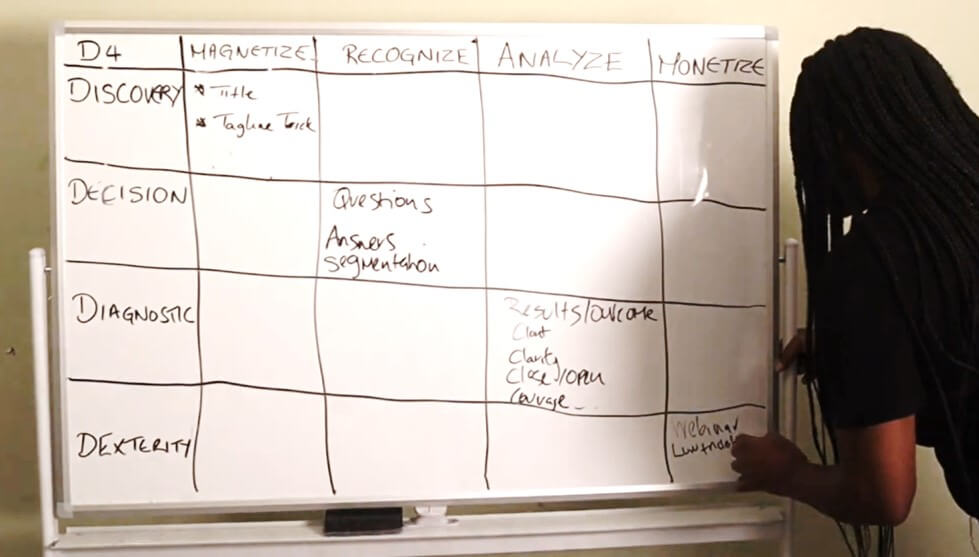
You can explore my quiz matrix by clicking here
You want questions that pack a punch. If the questions in your quiz do not reflect the pain points your target audience is feeling, then your quiz will not be successful. But the beauty of quizzes is that you can figure out what’s not working and fix it quickly.
The second question of my lead generation quiz helps visitors get crystal clear on one aspect of their business’s pain.
How to Best Capture Your Lead Generation Quiz Results
📓 Pro Tip: Before you give your quiz taker their results, you need to capture their information!!
It’s a big conversion killer to ask for your quiz taker’s email address before they begin your quiz. You also don’t want them to break stride in the middle of your quiz to enter what they might think is unnecessary email information.
If your quiz is enticing enough, if it nails down the pain points your prospective clients or customers are feeling, then they will want to know the results of your quiz.
- How much money do they need to retire comfortably at 62?
- What is the best natural acne treatment available to them?
- How do lead generation quizzes lead to massive income gains for you?
If you’ve spoken directly to your clients’ pain points through your quiz design and wording, they will be eager to give their information to you.

A view of how I collect contact information prior to displaying quiz results.
When you share quiz results to use the intel from your quiz, you have to remember: you’re the expert. Give users results that show you possess the experience and expertise to solve, diagnose, discover, and close the gap on whatever their pain points may be.
The 4 Cs of Quiz Results Are:
- ✔️ Clout/Credibility: Show your expertise to your audience. Who are you? Why are you qualified to give your quiz takers their results? Using my 15 years of experience as a certified financial planner, I’ve developed a formula to help you decide how much you need to save for retirement.
- ✔️ Clarity: Be clear as to why they have gotten the result they have. Don’t be wishy-washy here. Remember you’re speaking as an authority on your subject. You need to save 15% of your current income to retire at 62.
- ✔️Close the Loop: Ask another question. During this process, we are opening the door for the quiz taker to discover another answer to their question. This is where you lead them to your offer. Are you interested in opening a retirement savings account with a certified financial planner?
- ✔️ Courage: Give your quiz takers the courage to take action on their problem. Schedule a Zoom call with me to learn how you can prepare for retirement.
Remember you’re trying to get your potential clients to not only take your quiz but also sign up for your offer.
Accepting your offer is the important part because this is what drives your bottom line, your success as a coach, consultant, entrepreneur, etc.
Your quiz is just the magnet that pulls people into the offer, giving them the courage to take action to solve their problems as you have identified in your quiz.
A view of the call to action after quiz takers see their results.
Click Here to Find Out Which Celebrity Entrepreneur You’re Most Like.
Generate Scroll-Stopping Quiz Titles for Free
🏰 The M.O.A.T Method 🏰
I love a quote from Warren Buffett, one of the world’s richest people. He’s made billions upon billions of dollars investing in the stock market. He lives in Omaha, Nebraska in a house worth less than a million dollars and plays the mandolin for fun.
Warren Buffet said, “In business, I look for economic castles protected by unbreachable moats.”
Warren might have been referring to his investments—he looks for companies that can’t be breached by the competition.
Buffett also doesn’t invest in companies where he can’t understand what they do. Knowledge and expertise are important to Warren Buffett.
I like to approach Buffett’s quote this way. I think about your niche, my niche, and everyone’s niche as their economic castle.
We are all selling something to our niche. We are speaking to our niche, trying to appeal to them with our offer. They give us money, and we give them something of value. They’re part of our economic castle.
What do you need to do to protect your economic castle from your competitors? How can you make sure that your niche comes to you and not your competition?
You build an unbreachable moat.
My M.O.A.T method secures your economic castle. It is:
-
🏰 Multi-Archetype Quiz Model
-
🏰 Offer-Segmented List
-
🏰 Automated Case Study Series
-
🏰 Ten Point Traffic Influx
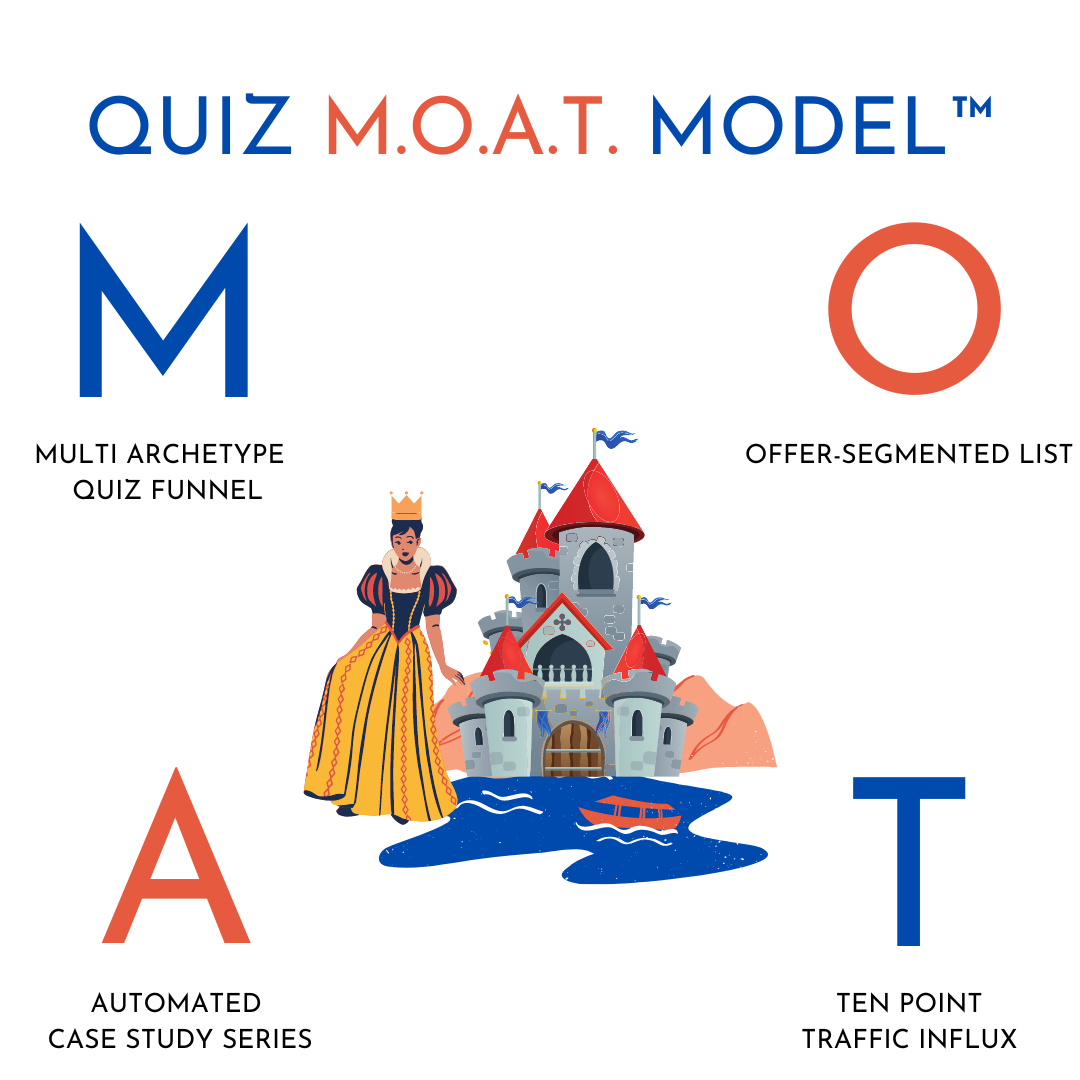
Here we’ll discuss the first step of my M.O.A.T method for securing your economic castle. Want more? Click here to work with me directly.
Lead Generation Quiz Archetypes
In marketing lingo, consumer personas or avatars are fictitious ideal customers. The purpose of creating a consumer avatar is so that you can understand who your ideal customer is and then find them.
Some describe avatars as “a detailed profile of your ideal customer.”
But there’s an important problem with avatars. Consumer avatars are individuals. You can add as much detail, as much sugar and spice, to your avatar as you want, but you can’t change the fact that you’ll be looking for a single customer.
An ideal single customer.
The problem with avatars is that you can’t categorize people into groups. It makes it difficult to scale your business. It might be a good first step in understanding who your potential clients or customers are, but it doesn’t do enough.
To effectively target your prospective customers and clients, you need to think about your audience in terms of archetypes.
How is an archetype different from an avatar?
Archetypes are often psychologically-based groups of people with a dominant character trait. All Fortune 500 companies and the biggest brands in the world use archetypes to message their audience.
When you work with me, I will help you identify your archetypes and implement them in your lead generation quiz so you can convert quiz takers into customers.
Let me show you an example of a marketing archetype.
Nike sells sneakers. Saying Nike sells sneakers is like saying the Pope is Catholic. Nike is the epitome of sneakers. Nike created the very idea of sneakers.
Nike sells a lot of other things as well. One of the things they sell is their own brand. But Nike also sells a bunch of sneakers.
How did Nike find and create an audience for their sneakers?
Easy: they picked a common personality archetype and marketed the heck out of it.
In 1980, Nike was a struggling company. Phil Knight begged rookie Magic Johnson to sign a shoe deal with them. Magic went with Converse. Had Magic taken Nike’s deal, he’d be the richest athlete in the history of the world. Knight offered Magic Nike stock options.
You might know the rest of the story: Nike found Michael Jordan. Michael Jordan became a hero, going on to win six NBA championships.
“Just Do It” became Nike’s motto.
Nike markets mainly around the HERO archetype.
The common characteristics of customers who want to see themselves as HEROES are:
- 💪 Physical or magical strength
- 💪 Mental, physical, and emotional resilience
- 💪 Persistence
- 💪 Courage
- 💪 A sense of right and wrong
- 💪 Commitment
These are the characteristics of the hero archetype, and these are the customers, if you’re Nike, that you’re trying to reach.
The Complexity of Archetypes
When it comes to the user archetypes you’re targeting to turn into customers with your lead magnet quiz, it is more complicated than you likely think.
Let’s again look at the example of Nike and the HERO archetype we examined above.
Nike wants to give the sense that when you wear their shoes, you will be able to accomplish all sorts of things.
If you’re putting together your lead magnet quiz, and you’re targeting potential customers who fall under the HERO archetype you might think you need to pitch how your service or product will enable them to do great things.
Lead generation quizzes allow you to personalize and segment your target audience.
Your quiz takers are smart. They know that buying a certain brand of shoe isn’t going to allow them to dunk a basketball like Michael Jordan—at least, most of your customers are aware of this fact.
So, personalizing your lead magnet quiz allows your audience to see themselves as the hero of their own story.
What do I mean by personalization when it comes to thinking about your user archetypes?
Lead generation quizzes allow you to segment your audience into categories. It gives you important information (market intelligence) about their goals, aspirations, and pain points.
Nike knows that it has all kinds of potential customers, which is why they produce advertising like this:

This still shot comes from a video ad that starts on a barren highway in rural America. A figure emerges who appears to be a runner.
As the person enters the frame, the narrator of the commercial says the following:
“Greatness. It’s just something we made up. Somehow we come to believe greatness is a gift, reserved for a chosen few: the prodigies, the superstars. And the rest of us can only stand by watching. You can forget that. Greatness is not some rare DNA strand. It’s not some precious thing. Greatness is no more unique to us than breathing. We’re all capable of it. All of us.”
As the narrator ends, you see that the person who has been running toward the camera is an overweight teen.
The commercial ends with the slogan Find Your Greatness, along with the famous Nike swoosh.
The point of this commercial is to appeal to our better nature. But the real point of every commercial is to convert prospective customers into taking an offer.
Nike realized that people who buy their shoes probably look more like the person in this commercial than they do Michael Jordan.
Maybe they struggle with their weight. Maybe they’re not amazing athletes. These HEROES want to be assured that Nike shoes are for them.
For example, if you’re a diet coach, or exercise or nutrition consultant, you might want to craft your lead magnet quiz so that you cover different types of potential people who need your professional expertise. Does it target people of different weights, ethnicities, and beliefs? Maybe? Maybe not? It all depends on your offer.
The HERO archetype tells you something about the pain points of your potential customers, while your lead generation quiz will help you segment them into more specific categories of clients.
Ready to start intriguing your ideal clients today? Use my FREE Quiz Title Generator tool to create magnetic quiz titles in seconds.
The Importance of Archetypes to Lead Magnet Quizzes
I’m spending a lot of time discussing archetypes here because this is a common place where people get stuck in the creation of their lead generation quizzes.
The example above from Nike relates to a key issue in using archetypes.
So far, I have been discussing archetypes as if they were a psychological phenomenon. Your potential clients or customers will identify with a particular type.
Archetypes were invented by the Freudian psychoanalyst Carl Jung. What Jung wanted to show was that they were common archetypes (or themes) that were universal to everyone.
As Jung pointed out though, archetypes are not set in stone. One day you may feel like the HERO; other days you feel more like the REBEL.
More importantly, the customer/client archetypes you use in your lead magnet quiz need to address your quiz taker’s particular concerns. I recommend that you limit the number of archetypes you’re trying to reach in your quiz to 4.
If you identify too many types of users who would benefit from your products or services then you can’t segment them effectively.
When you work with me, we will go over how to segment and optimize your list. When it comes to finding your prospective clients or customers and getting them to accept your offer, you need to have a properly segmented and optimized list.
Enticing Your Archetypes 🧲
But before you can start to optimize your list, you still need to figure out your archetypes.
There are several different ways to entice your archetypes. My favorites are phased-based archetypes, so we’ll start there.
Remember the Nike commercial above: the person was not yet a hero, but they were on the path to becoming one.
Greatness is not a gift. The implication is that greatness is something that you need to work toward.
 In my own lead generation quiz, I correlated the results to the quiz taker’s self-ascribed identity. This helps me match the offer to the quiz taker based on her archetype.
In my own lead generation quiz, I correlated the results to the quiz taker’s self-ascribed identity. This helps me match the offer to the quiz taker based on her archetype.
Phased-Based Archetypes
Phased-Based archetypes are at a certain phase in their professional or personal lives. They want to achieve more, but they don’t know how.
I personally work with clients who have achieved six figures in revenue in their business. They have done well, but they want to do better.
How do I cultivate these clients from the rest of my quiz takers? This comes in the results they receive from taking my quiz.
You want to be upbeat and positive about your quiz takers’ results. Regardless of where they are in their journey (the phase they’re in) or their psychological profile, you want results that make them feel good about themselves.
Giving your quiz takers encouraging results will make them more likely to sign up for your offer!
When you work with me, we will talk about the design and language you use on your results page.
If I were giving results to someone who is new to their online business, I might say something like “You’re a Go-Getter Newbie.”
Whatever the phase of your quiz taker, you should be positive, even if you ultimately want to repel them from taking your offer.
Like the lead generation quiz examples I gave earlier, discovering what will appeal best to your selected archetypes is important in defining who your quiz taker is.
What problem are they trying to solve? Phased-based archetypes want to level up to the next phase in their careers or personal lives.
In designing the best lead generation quiz for phase-based quiz takers, you need to understand where they are and whatever pain point is keeping them from reaching the next stage.
Problem-Based Archetypes
When you’re designing a quiz for a problem-based archetype, you’re answering the question to a problem your quiz taker is having.
Many of the best lead generation quizzes take a problem-based archetypal approach in addressing their prospective clients’ pain points.
What is the problem your users are having?
Do they need to discover the best skin care products for their complexion? Do they need to know how they can retire at 62? Do they want to understand what it takes to use quizzes for lead generation?
Whatever the problem they are having, you are solving it in your quiz, and giving them results.
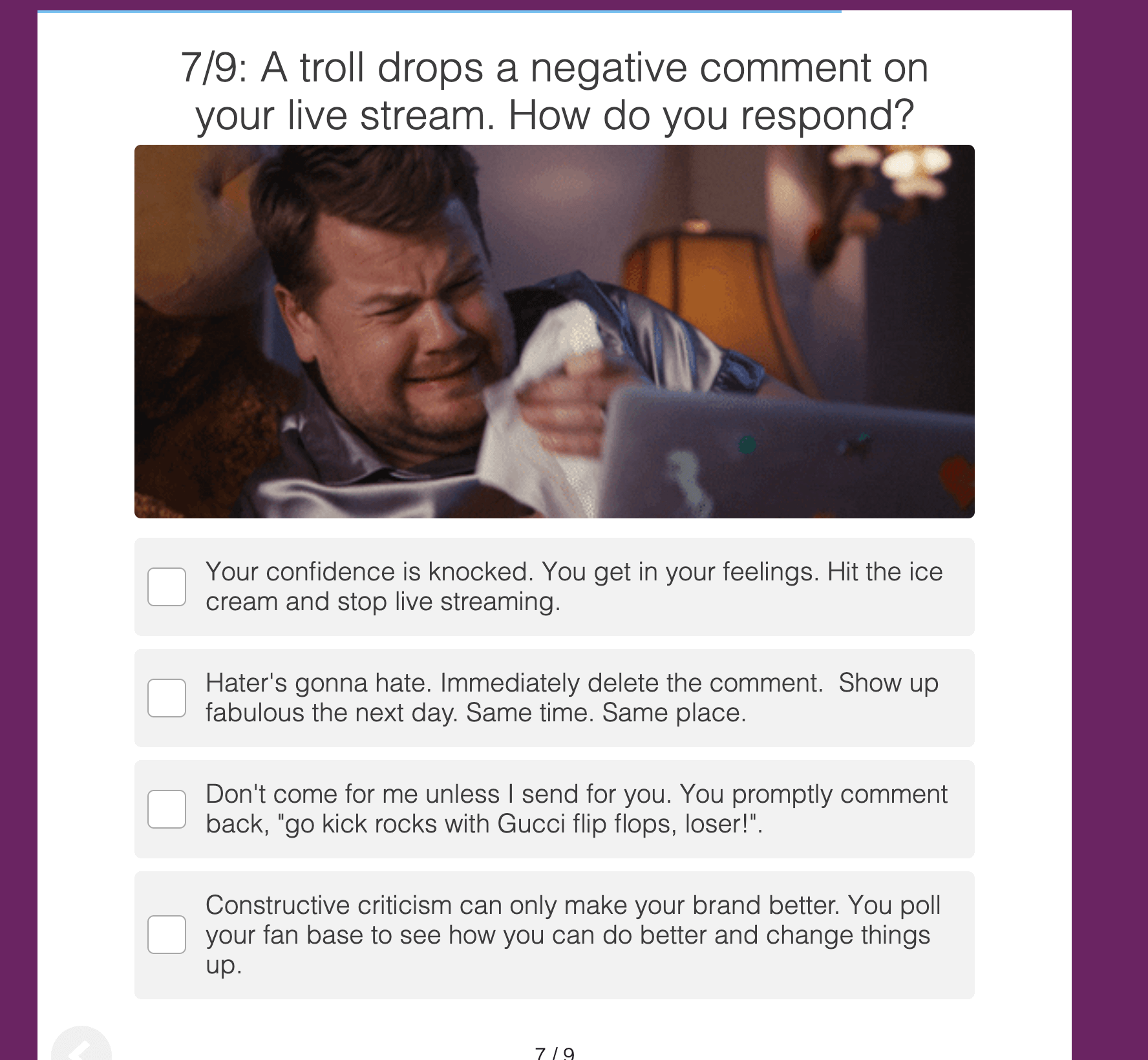
Here’s an example of a problem my ideal clients face routinely. Knowing how they respond to criticism gives me crucial insight into what offer will work best for them and how I can help them get the results they need.
Whether you answer their question or solve their problem, you need to be positive about the result. It’s the same as a phase-based quiz or any quiz type. Staying positive with their results guides them to your offer!
Preference-Based Archetypes
In designing lead magnet quizzes for your archetypal users, you may want to determine their preferences.
What hair color goes with what season?
Preference-based archetypal quizzes discover what is most important to your quiz taker by assessing what their preferences are given certain conditions.
And what are those conditions?
Well, it all comes down to your offer. What do you want your quiz taker to do after they have explained through your lead generation quiz that they want to eat more fruits and vegetables to lose weight?
As a nutritional consultant, it should be easy. You have a diet plan that consists of a lot of fruits and vegetables to help them lose weight.
What would you like them to do with this information?
Perhaps you want them to sit down with you for a 15-minute Zoom call to offer an assessment of their metabolic profile.
Whatever your offer is, your quiz should lead your archetypal users to it.
Figuring out what and who your archetypes are is tricky for some. But it shouldn’t be. Your archetypes are the type of clients your offer will attract.
This is where market segmentation comes in: to attract the client or customer that you want, you need to think thoughtfully about how you are posing your questions.
You need to put the work in to find out who your audience is through lead generation quizzes in order to lay claim to that 6-figure or 7-figure revenue.
Before we jump into discussing lead generation quiz software, you’ll notice that I didn’t pay as much attention to psychology-based archetypal quizzes.
What I will say is that you can always identify the psychological profile of your prospective client or customer in order to encourage them to take your offer. Again, it depends completely on your offer.
Lead Generation Quizzes for Growing Your Business
There was so much I couldn’t cover here. For example, we only made it through one of my M.O.A.T. categories. Deep discussion of how to optimize your email list into segments, the importance of authoritative case studies and how they can grow your business into 6, 7, and even 8 figures, and the all-important Ten Point Traffic Influx are all aspects I cover when you work with me
You can learn more about how to work with me here.
Key Takeaways
The most important takeaways of this article are:
-
💰 Lead generation quizzes (also called opt-in quizzes) are better than any other lead magnet in attracting the right potential clients or customers to your offer
-
💰 If done correctly, these quizzes will get people to take your offer in high numbers
-
💰 Your email list from your quiz takers will be the KING of your business
Congratulations! If you’ve made it this far in the article, pat yourself on the back. You’re much closer to exploding your business growth than 99% of others in your niche.
If this article was helpful and you’re ready to take your business to the next level with lead generation quizzes, check out my FREE quiz title generator. It will equip you with quiz topic ideas, intriguing hooks to catch your audience, and positioning language to use while developing your quick.
Get FREE, Hotter ‘n Heck Quiz Titles Now
About Caroline Onyedinma: Get to Know the Queen of Lead Generation Quizzes
If you’ve used or even thought about using quizzes to generate better leads for your business, you might have heard of Josh Haynam, the CEO of Interact, online software for building quizzes.
It was Josh Haynam who named me the “Queen of Quizzes” because he acknowledged that I was doing something with quizzes he admired: turning them into revenue-rewarding, lead-enrichment machines to grow my clients’ businesses.

I have worked with dozens upon dozens of online coaches, beauty moguls, eCommerce entrepreneurs, consultants, and others to help them achieve six and seven-figure revenue year after year.
Now, I’m sharing my knowledge with you so you can also reap the rewards of using the right quiz for your audience to explode your business like never before.
Truth Bomb: If you think your PDF lead magnet is going to do the heavy lifting of getting you past the $1 million dollar mark in sales, think again. You need better leads. You need an email list of customers actually interested in your offer.
You can click here to work with me or explore my free quiz title generator to get a jump on building your business.
If you take nothing else away from this article, take this: You need lead generation quizzes!
Learn From the Queen of Quizzes
